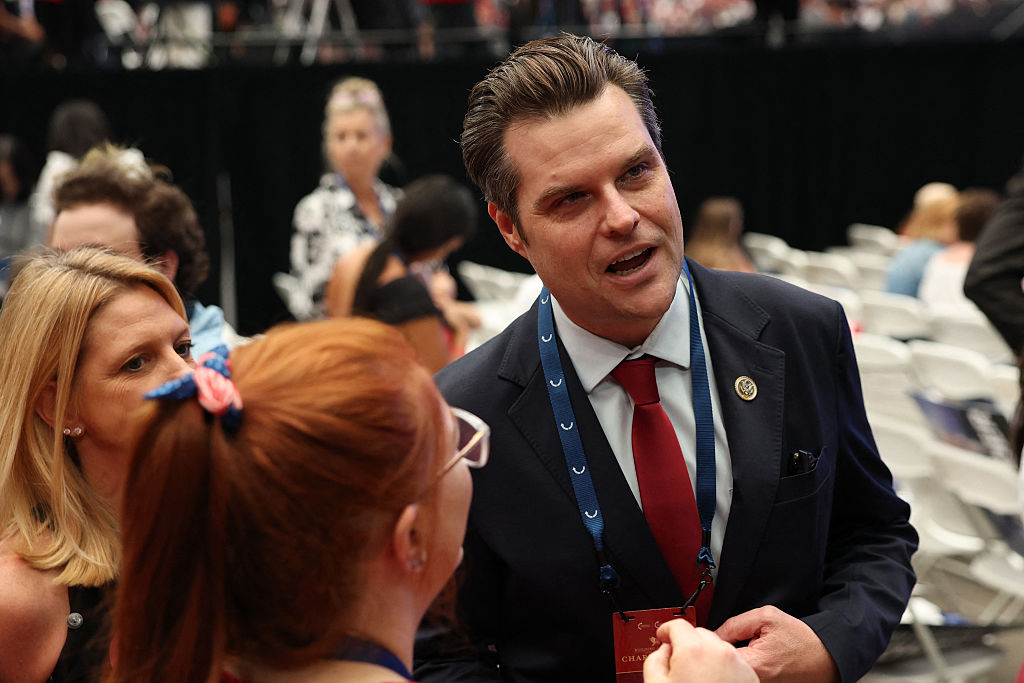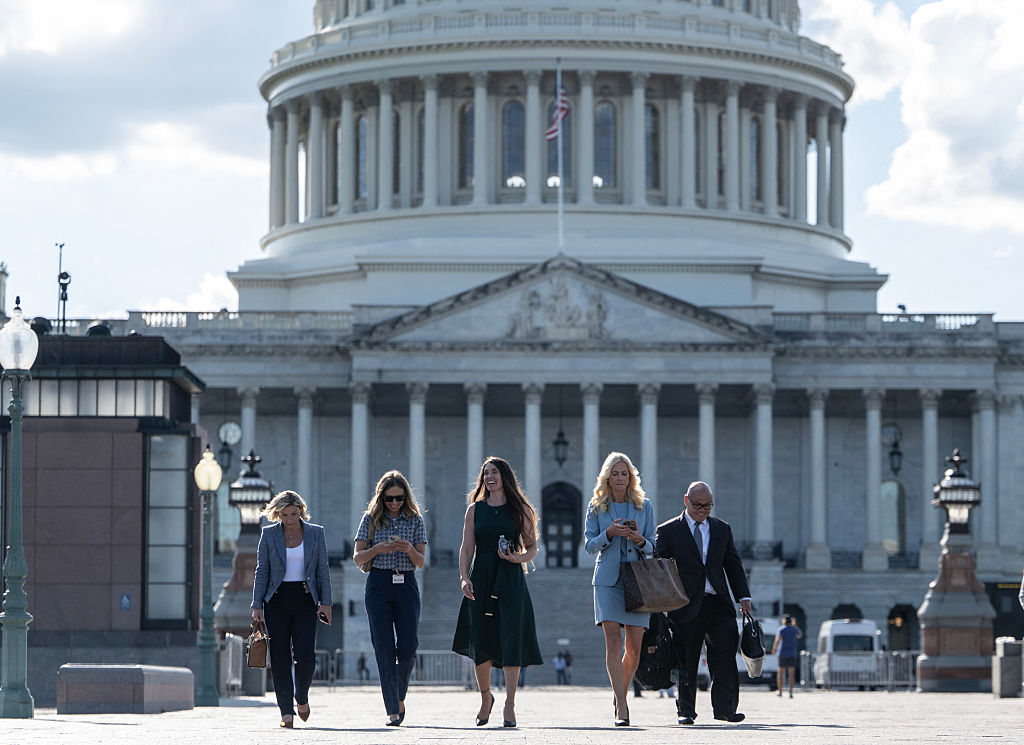politics
Page: 3
Matt Gaetz saw his bid to become Attorney General fizzle after the House Ethics Committee heard testimony from a woman who alleged that they had sex when she was a homeless teen. Matt Gaetz, a former Florida Republican Party congressman, had denied any dealings with the woman.
The New York Times detailed the life and struggles of the 17-year-old woman, who worked in a fast food restaurant and lived in a shelter with a parent. The woman said that she turned to prostitution and was made to have sex with powerful men to save up for braces. The woman said she pretended to be 18 and posted images of herself on a website for men looking to find “companionship.”
The Justice Department investigated Gaetz on child sex trafficking allegations, but nothing ever materialized. President Donald Trump went all in with choosing Gaetz to be his Attorney General. However, the rumors and chatter around the allegations of sex with minors grew to be too much, prompting Gaetz to resign from Congress and withdraw his name from the consideration floated by Trump.
Love Hip-Hop Wired? Get more! Join the Hip-Hop Wired Newsletter
We care about your data. See our privacy policy.
Last year, the House Ethics Committee report found significant connections that Gaetz allegedly paid women to have sex with him, having sex with a minor, illegal drug use, and for accepting gifts outside the confines of legal boundaries.
Gaetz responded to the Times‘ report regarding the woman, stating that her account is all made up.
“I never had sex with this person. This person threatened me with a lawsuit if I didn’t pay her $2.3 million dollars. She never sued me because her story is fiction,” Gaetz said to the Times.
The developments come as the House Ethics Committee just unleashed several thousand documents connected to the late financier Jeffrey Epstein, whose connection to the underground sex rings has dogged the Trump administration for the past year.
—
Photo: Getty

Trending on Billboard Elon Musk is on track to become the world’s first-ever trillionaire — and Billie Eilish, who just a few weeks ago made her feelings about billionaires quite clear, is not happy about it. In response to the news that the Tesla CEO’s net worth is nearing 13 digits, the pop star reposted […]
Source: Davidoff Studios Photography / Getty
On Wednesday (November 12), Democrats on the House Oversight Committee released three emails from the trove of documents related to the estate of convicted sex offender Jeffrey Epstein, in which there are allegations that President Donald Trump knew about his exploits during their friendship. Republicans would release another huge swath of emails, and the findings to this point have sparked severe reactions from members of Congress and observers.
The reactions come as the House of Representatives convenved to vote on the funding bill agreed upon in the Senate earlier in the week, ending the shutdown of the federal government which lasted 43 days. That also led to the swearing in of Representative Adriana Grijalva, a Democrat from Arizona who won her seat nearly two months ago.
After being sworn in by House Majority Leader Mike Johnson, Grijalva signed onto a bipartisan petition to force a vote demanding the White House and the Justice Department release the full trove of files related to Epstein, who took his own life in 2020. Johnson has promised that the vote will take place next week. The
Democratic Representative Ruben Gallego highlighted one of the emails in a post on X, formerly Twitter, writing: “April 2011 email from Epstein to Maxwell: “I want you to realize that that dog that hasn’t barked is Trump.” Where there’s smoke there’s fire…”
Former Pentagon Special Counsel Ryan Goodman viewed it as ominous. “It begins. Clearly incriminating against president of the United States,” he wrote, sharing images of the three emails released by the House Democrats.
A user on BlueSky named Mozilla pointed out one damning Epstein comment in their post.
Kyle Griffin highlighted another email from Epstein in 2018 which painted Trump in a bad light: “I know how dirty Donald is.”
Democratic strategeist Adam Parkhomenko called out Vice President JD Vance’s past tweet calling Epstein and his association with powerful figures out, writing: “Donald Trump was President when Epstein died and Donald Trump is on the Epstein list. Let’s talk about it.”
Columnist Jamelle Bouie voiced the growing opinion that the federal shutdown was all done by Republicans to protect Trump.
Source: Davidoff Studios Photography / Getty
On Wednesday (November 12), Democrats on the House Oversight Committee released three emails from the trove of documents related to the estate of convicted sex offender Jeffrey Epstein, in which there are allegations that President Donald Trump knew about his exploits during their friendship. Republicans would release another huge swath of emails, and the findings to this point have sparked severe reactions from members of Congress and observers.
The reactions come as the House of Representatives convenved to vote on the funding bill agreed upon in the Senate earlier in the week, ending the shutdown of the federal government which lasted 43 days. That also led to the swearing in of Representative Adriana Grijalva, a Democrat from Arizona who won her seat nearly two months ago.
After being sworn in by House Majority Leader Mike Johnson, Grijalva signed onto a bipartisan petition to force a vote demanding the White House and the Justice Department release the full trove of files related to Epstein, who took his own life in 2020. Johnson has promised that the vote will take place next week. The
Democratic Representative Ruben Gallego highlighted one of the emails in a post on X, formerly Twitter, writing: “April 2011 email from Epstein to Maxwell: “I want you to realize that that dog that hasn’t barked is Trump.” Where there’s smoke there’s fire…”
Former Pentagon Special Counsel Ryan Goodman viewed it as ominous. “It begins. Clearly incriminating against president of the United States,” he wrote, sharing images of the three emails released by the House Democrats.
A user on BlueSky named Mozilla pointed out one damning Epstein comment in their post.
Kyle Griffin highlighted another email from Epstein in 2018 which painted Trump in a bad light: “I know how dirty Donald is.”
Democratic strategeist Adam Parkhomenko called out Vice President JD Vance’s past tweet calling Epstein and his association with powerful figures out, writing: “Donald Trump was President when Epstein died and Donald Trump is on the Epstein list. Let’s talk about it.”
Columnist Jamelle Bouie voiced the growing opinion that the federal shutdown was all done by Republicans to protect Trump.
House members on both sides of the aisle unleashed a bombshell set of emails and documents from Jeffrey Epstein, signaling a ramping up of the efforts to investigate the findings for wider wrongdoing. While some observers believe the documents could be damaging to President Donald Trump, the alleged friend of the late Epstein, he shrugged off the moment as a “smear.”
The House Oversight Committee, comprised of members of both major parties, released a small number of emails on Wednesday (November 12) that suggested Trump and Epstein were more aligned with each other opposite of what he had expressed in recent times.
The release of the documents comes as Rep. Adelita Grijalva was finally sworn in after weeks of assumed stalling by House Speaker Mike Johnson to keep the crucial 218th vote to move the petition to unveil the files from going forward.
Love Hip-Hop Wired? Get more! Join the Hip-Hop Wired Newsletter
We care about your data. See our privacy policy.
Retail giant Walmart removed a T-shirt and a hooded sweatshirt that depicted a Nazi salute emblazoned on the front, after a multitude of complaints on social media. The T-shirt and hoodie carried the phrase “Paper Beats Rock,” and it showed one hand raised with a flat hand in the upper right corner towering over a raised clenched fist in the lower left corner, holding a rock. The symbolism suggested that fascism would beat Black activism, which prominently uses the raised fist in its protest movements.
The T-shirt and hoodie were made by multiple third-party groups, who listed them for sale on Walmart. One of them, “The Basic Shop,” was identified by online watchdog group LeftCoastRightWatch. There were also reports that the offensive items were available on Amazon. In response, social media users began to work to get the shirts removed, with a Reddit forum dedicated to combating far-right ideologies providing a contact phone number and an online form. According to Snopes, the items were removed from Walmart’s site on Nov. 10.
“We have zero tolerance for any prohibited or offensive products appearing on our marketplace,” a statement from Walmart said. “The items in question were listed by a third-party seller and have been removed from our site for violating our prohibited products policy. When issues like this are identified, we act immediately to remove them and strengthen our systems to prevent a recurrence. The trust of our customers and the integrity of our platform remain paramount.”
It isn’t the first time that Walmart has been called out for having offensive items like this for sale on its website. According to Rolling Stone, the superstore was in hot water last September when a third-party retailer posted two T-shirts promoting the infamous white-power group Skrewdriver on their website.
In an email to LeftCoastRightWatch, Walmart’s Director of Global Communications for the U.S. Marketplace, Blair Cromwell, said: “We have clear guidelines in place, and when items are identified as not meeting our standards or requirements, they are promptly removed and remain blocked from the site. We take these matters seriously and are committed to maintaining a trusted and respectful experience for our customers and communities.”
—
Photo: Getty
On Wednesday morning (November 12), Democrats on the House Oversight Committee released a new set of emails from disgraced financier Jeffrey Epstein, in which he alleges that President Donald Trump had keen knowledge of his activities in abusing young women. The emails, taken from thousands of documents received by the committee, are part of the committee’s investigation into Epstein and his accomplice, Ghislaine Maxwell, and their ties to the president, who has denied knowing Epstein.
“These latest emails and correspondence raise glaring questions about what else the White House is hiding and the nature of the relationship between Epstein and the president,” said Representative Robert Garcia of California, the top Democrat on the committee. The emails were from three conversations, one with Maxwell and two with author Michael Wolff, years after Epstein’s falling out with Trump and his 2008 plea deal in Florida on state charges of soliciting prostitution.
In the email to Maxwell, Epstein wrote, “I want you to realize that dog that hasn’t barked is Trump.” He then wrote that an unnamed victim “spent hours at my house with him ,, he has never once been mentioned.” Maxwell replied, “I have been thinking about that.” Maxwell is serving a 20-year sentence after being convicted of charges related to helping to facilitate Epstein’s abuse. The revelation comes as Democrats, citing a whistleblower, claim that Maxwell intends to ask Trump for a commutation of her sentence this week.
In one of the other email exchanges with Wolff, Epstein wrote of Trump: “Of course he knew about the girls as he asked Ghislaine to stop.” In the third email exchange from 2015, Wolff had asked Epstein if he was prepared for CNN to ask Trump about their relationship, and advised him to not engage. “I think you should let him hang himself,” Wolff wrote, adding that it could “save him, generating a debt.”
The revelations come as the House of Representatives is set to vote on a funding bill passed by the Senate to end the government shutdown. House Majority Leader Mike Johnson is also expected to swear in Democrat Adelita Grijalva, whom he resisted swearing in after she won her election two months ago. It’s believed that once sworn in, she will be the final signature on a bipartisan petition forcing a House vote demanding that the White House release all of its files on Epstein, which it has adamantly refused to do.
—
Photo: Getty
Chi Ossé, the son of late broadcaster and attorney Reggie Ossé, is currently a New York city councilman who is aiming his efforts to challenge Rep. Hakeem Jeffries for the incumbent’s congressional seat. However, it appears that Chi Ossé’s political ambitions are clashing with those of New York Mayor-Elect Zohran Mamdani.
As reported by the New York Times, it appears that Chi Ossé, 27, is politically aligned with Mamdani. The young councilman’s desire to take on the top Democrat in the House of Representatives presents an issue of concern for the incoming mayor. Thus far, Mamdani has not thrown his support behind Ossé, who is aware that top Democratic Party officials are expressing “concern” regarding the front-facing individuals on that side of the aisle.
The outlet says that Mamdani has tried suggesting Ossé take another path and not run against the popular Jeffries, signaling possible fracturing within the party ranks on how to best move forward with the mayor-elect’s political aims and agendas. Jeffries, who presides over the Eighth congressional district, has held the seat for over 11 years. Jeffries is also the House Minority Leader and a fierce opponent of President Donald Trump’s policies.
The Times also shared that Ossé’s stance moved Mamdani’s team to not invite the councilman to an election night watch party, according to sources, despite campaigning for Mamdani. Should Chi Ossé move forward with his plans to challenge Jeffries, it has the potential to spark a tense race in the upcoming primary vote in June 2026.
—
Photo: Getty
On Sunday evening (November 9), the Senate voted in the first step towards ending the federal government shutdown, and Democrats have been feeling the brunt of the public’s disbelief. Seven senators, along with an independent senator, agreed to have the vote, and many expressed their anger and disappointment in social media posts once the news broke of the deal.
The vote was 60-40, with moderate Democrat Senators – Dick Durbin of Illinois, Tim Kaine of Virginia, Jeanne Shaheen and Maggie Hassan of New Hampshire, Cathleen Cortez-Masto of New Mexico, Jacky Rosen of Nevada, and John Fetterman of Pennsylvania. Independent Senator Angus King of Maine joined with the Democrats in voting on the continuing resolution.
They agreed to vote with Republicans on the funding package to reopen the government, securing a promise to vote on extending subsidies for the Affordable Care Act in December, which the GOP didn’t initially want. The subsidies reduce the costs for those enrolling, and if taken away, 4 million would lose health insurance, and 22 million more would see their premiums double.
The final version of the bill extends funding of the government to January 2026. The bill is expected to be passed in the GOP-majority House of Representatives, despite House Minority Leader Hakeem Jeffries and the other Democrats saying they will all vote no on it.
—
Photo: Getty
Senate Minority Leader Charles Schumer was a “no” vote, but has been the prime source of scorn by the public, who felt that the eight votes by Democrats were a betrayal after their holding fast during the 41 days of the shutdown. Independent Senator Bernie Sanders of Vermont called the concession “an empty gesture.” Paul Thompson ripped Schumer’s tendency to issue dry motivational social media posts in his own post on BlueSky.
The public’s frustration could be summed up in a post on X, formerly Twitter, by a user named Old Man Lefty: “We just had the most successful protests against a sitting president in history. We swept an off year election. Republicans were being blamed for the shutdown, and the ACA is damn near as popular as God. With all that momentum, why did 8 Democrats just punch us in the gut?”
In an interview with MSNBC’s Kris Jansing on Tuesday (November 11), Arizona Senator Mark Kelly signaled that discussions about replacing Schumer are indeed happening in the Senate.
ADAM GRAY / Donald Trump / Rudy Giuliani
Donald Trump and MAGA Republicans are currently complaining about Joe Biden’s alleged“abuse” of the autopen, but it’s all good that he continues to issue pardons to absolutely despicable people.
Late Sunday, Ed Martin, the pardon attorney in Donald Trump’s administration, released a list of 75 people who received pardons from Trump. On it, Rudy Giuliani is one of the names that stood out, along with other loyal MAGA folks who tried to overturn the 2020 presidential election.
Deadline reports the pardons apply to “conduct relating to the advice, creation, organization, execution, submission, support, voting, activities, participation in, or advocacy for or of any slate or proposed slate of Presidential electors, whether or not recognized by any state or state official, in connection with the 2020 presidential election, as well for conduct relating to their efforts to expose voting fraid and vulnerabilities in the 2020 Presidential Election.”
Along with his right-hand man in corruption, Rudy Giuliani, other names on that list include: Sidney Powell, Boris Epshteyn, Mark Meadows, Christina Bobb, Kenneth Chesebro, Jeffrey Clark, John Eastman, and Jenna Ellis.
A good number of the people on that list tried and failed to present a list of alternate electors to Congress in a heada** attempt to overturn Joe Biden’s electoral victory.
No one on the list was charged with federal crimes, but pardons would prevent future federal indictments.
The pardons do not cancel out charges brought at the state level.
Social media is not shocked, but still disgusted at Trump’s continued push of an outright lie, and letting every person who tried to subvert the results of the 2020 election and nullify former President Joe Biden’s victory.
You can see more reactions below.

 State Champ Radio
State Champ Radio 








